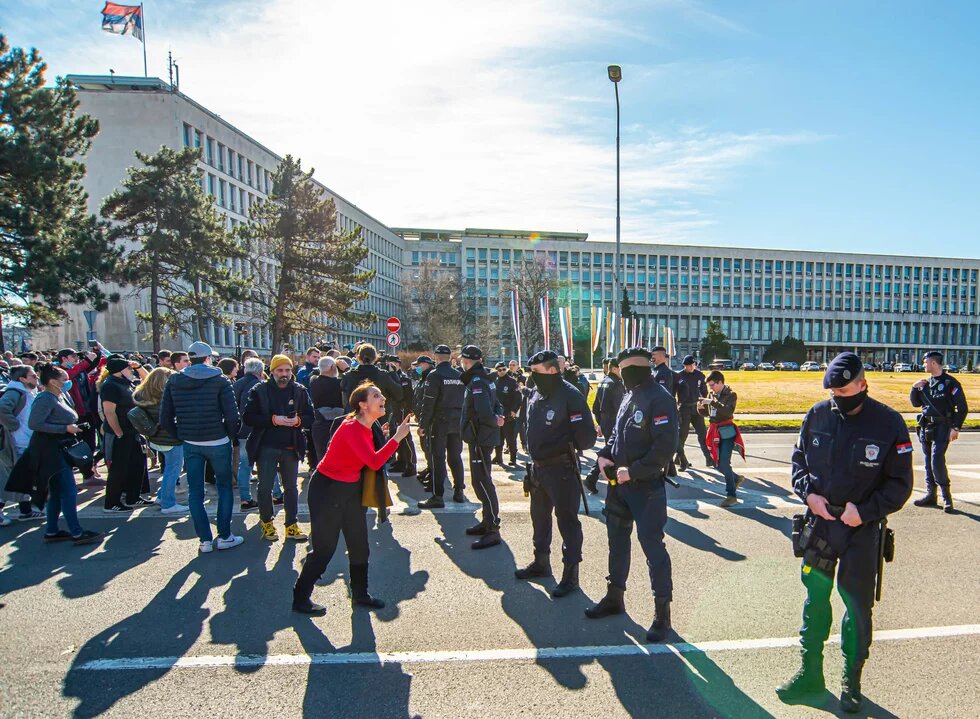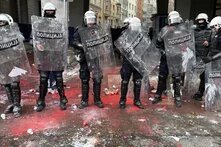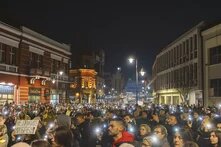The lithium deal brings a new quality to Serbia’s foreign policy zigzagging. At one stroke, Serbia became a strategic partner and the guarantor for the future of the European Green Deal.

From demise to resurrection of the lithium plans in Serbia
On 10 August of this year, tens of thousands of people turned out to protest the planned lithium extraction in the Jadar Valley, feeding hopes among some long-term opponents of the regime of Aleksandar Vučić that Serbia was going to wake up, that a new coalition against the pervasive power of the Serbian Progressive Party (SNS) and of President Vučić might be possible. The more sceptical among them remembered all the protests of the past years and how they ended: The mass rallies in late 2018 (the “1 of 5 million” protests) that brought vast crowds into the streets of Belgrade and of Serbia – and fizzled out completely in 2020. The fierce protests that erupted during the coronavirus pandemic in 2020, and the relative ease with which the regime manoeuvred its way out of the situation with snap elections.
In 2021, a wave of mass environmental demonstrations protesting the plans to extract lithium from the Jadar Valley began. In the eyes of the protestors, the mining multinational Rio Tinto had become a symbol of ecological destruction, the Serbian regime’s plans the epitome of state-run clientelism and corruption. The pressure mounted, there was a noticeable erosion of Vučić’s popularity and that of his SNS party. Then, in December 2021, in what now appears to have been a masterful populist volte-face, Aleksandar Vučić himself put an end to the plans for the Rio Tinto lithium project. Seen and celebrated as one of the greatest triumphs of the most recent protest movements in Serbia, this proved a Pyrrhic victory: with the pressure on, the benign “father of the nation” managed to frame himself as an understanding leader who had heard his people and saved the Jadar Valley from ecological destruction by stopping the planned lithium mining project. And then Vučić had officials prepare for another early election, as he had done during the pandemic. An election that he managed to bring home for himself and his party, despite some small gains for the liberal, green and democratic parties.
One chapter had ended, but the story of the protests was not yet over. On the contrary, the movement reached its climax (thus far) in the enormous civic anti-violence protests launched in May 2023 in reaction to the school shooting in Belgrade and another shooting spree near Mladenovac. The scenes of tens of thousands of people gathering in Belgrade and other cities in Serbia to commemorate the victims and give voice to their anger at the regime were staggering and heartening. But the initial shock passed, and within a relatively short time the regime’s propaganda machine blazoned forth with the usual narrative of an opposition working against Serbia’s interests. Meanwhile, Vučić reached for one the well-oiled levers that he regularly pulls when pressure from the opposition and protestors gets out of hand: the Kosovo issue. One simply arranges for the situation in northern Kosovo to escalate and – voila! – the images dominating the media are of the president, looking grave and concerned, and going without sleep in his never-ceasing struggle on behalf of “the Serbian people” in Kosovo. The protest wave ebbed in the summer of 2023 and then stopped completely, swept under by the campaign for yet another early election to be held that December.
Screeching U-turns: from criticism of electoral fraud to “strategic partnership”
The voting on 17 December was tumultuous – many were shocked by the images of large-scale vote rigging and the obvious absence of any attempt to disguise the election manipulation. That the election, like those that preceded it, were neither free nor fair did not deter the (once again) victorious SNS and President Vučić from celebrating the results this time either. It seemed, though, that the EU and the West had had enough, including Germany, presumably. In a post (of no more than historical relevance now) on the platform X, the Federal Foreign Office in Berlin informed Vučić that this massive electoral manipulation and fraud was unacceptable. Criticism from numerous European capitals followed, and the European Parliament also expressed itself in clear terms when Vučić und his SNS disciples railed against the MEPs in the OSCE election observation mission. Considerable public pressure over Serbia and its president built up in international media: the electoral fraud was condemned in unambiguous language, the authoritarian tendencies of the regime were systematically dissected, and there was much discussion of the zigzag approach to foreign policy – now moving closer towards the West, then swerving away towards Russia or China – that Vučić had perfected over all the years of his rule. Inside Serbia, the regime shifted its propaganda machine into high gear, fulminating against the “evil West” and the opposition.
Germany, too, came under heavy fire from the regime’s media. And in fact, German politicians were the source of quite a few of the post-election signals telling Vučić that his authoritarian course in domestic policy and foreign policy flirtations with China and Russia were unacceptable. A point in case: the visit of Germany’s defence minister, Boris Pistorius, to Kosovo and Serbia in February 2024. At the start of his trip, Pistorius made a remark that did not go down at all well in Belgrade: Serbia could not, he said, “dance at two weddings” at the same time, a direct allusion to the country’s zigzag foreign policy. Pistorius’ conversation with Vučić in Belgrade was likely rather chilly in tone but evidently quite straightforward in content: at the time, Pistorius described the exchange as “not lacking in clarity”. During the press conference, Pistorius stated unequivocally that Russia’s influence was felt “through various channels” in Serbia, and that Serbia was ultimately going to have to choose between Russia and the EU.
We’ve come nearly full circle now and have almost arrived at the beginning of a breakneck upswing in the prospects of the lithium plans that began with Chancellor Scholz’ visit to Belgrade in July of this year and the new memoranda on the creation of a “strategic partnership” on lithium between Serbia and the EU. In March 2024, Vučić, responding to all the domestic and above all international and European pressure, arranged for a rerun of the voting in Belgrade and a few other districts. The opposition could not agree on a common approach, and the anti-regime momentum that had built up inside the country was lost. Vučić was firmly back in the saddle once again.
Before the dust had settled, the plans for lithium extraction in the Jadar Valley, which had clearly been rolling along behind the scenes, were back on the table. It had not taken very long: in January 2020, Prime Minister Brnabić’s said of Rio Tinto and Jadar, “[e]verything is over. It’s over”. In November 2020, Vučić called himself “the stupidest president in the world” for having buried the lithium plans, and in July 2024, the Serbia’s Constitutional Court, unquestionably controlled by the regime, ruled that the decision to stop the lithium plans in the Jadar Valley had been unconstitutional.
The West’s pragmatic opportunistic transactionalism
The way had been cleared for the lithium project to pull into the fast lane in Serbia, and apparently also for the EU and above all Germany to make what was a no less breakneck U-turn in their policy towards Serbia. After the December election, the politicians were faulting the regime for electoral fraud and trying to put greater pressure on Vučić, but now – screech! – the rhetoric was all about close partnership with Serbia. The highpoint of this new policy was probably Chancellor Scholz’s visit to Belgrade on 19 July 2024 and the drafting and signing there of a memorandum of understanding on “strategic partnership” in the extraction and exploitation of lithium. The headline in the TAZ (22 July 2024), the German daily, read “prime minister on lithium hunt”. At a single stroke, Serbia became a strategic partner and the guarantor for the future of the European Green Deal. All was (and apparently still is) forgotten – the electoral fraud, the increasingly strict authoritarian trend in domestic policy, the armed incursion into northern Kosovo by Serbian paramilitary forces in September 2023, Serbia’s close cooperation with China and Russia, geopolitical adversaries of the EU, Serbia’s refusal to join in on the European sanctions against the Putin regime. “Ah well, never mind,” was the impression that one got, almost had to get, from the images of Scholz and Vučić in Belgrade.
Thus, a new chapter in relations of the EU and the West with Serbia has presumably begun – the chapter of pragmatic opportunistic transactionalism, on whose altar Serbia’s democratic and European future may well be sacrificed once and for all. Or is it simply a revival of a Western Serbia policy that we’ve been all too familiar with since Angela Merkel’s day? Among the international community of Balkan experts, criticism of the West’s policy towards Serbia and Aleksandar Vučić has been on the daily agenda since well before Olaf Scholz’s visit to Belgrade. The talk of a policy of stabilitocracy promotion was not new in the Merkel era either, when the chancellor chose to take a pragmatic approach and compromise with Vučić, turning a blind eye (or possibly two) as he built his competitive authoritarian regime. The thinking in the EU and the US goes like this: Serbia is important for the stability of the Western Balkans, Serbia is needed for the settlement of the Kosovo-Serbia conflict, and keeping Serbia out of Putin’s orbit is an important objective. Thus, or so the logic goes, Vučić should be handled with care and allowed to do as he likes. This approach has frequently resulted in abrupt contortions, as we saw in 2023 when European Commission President Ursula von der Leyen, on a visit in Belgrade, praised “dear Aleksandar” and Serbia for the great progress they had made in the rule of law. With the signing of the memorandum of understanding in July, the demonstrative praise for Serbia and Aleksandar Vučić started up again almost as though it had never been interrupted. A case in point: Ursula von der Leyen’s praise for “a great meeting” with Aleksandar Vučić and for the lithium deal in a post on the platform X in late August 2024.
The authoritarian course of domestic policy in Serbia is growing ever more obvious – it is evident in the electoral fraud in December 2023 and in the curtailment of freedoms in the country, a recent example being the arrest of over 50 activists who took part in the biggest protests against the lithium plans in August 2024. This demonstrates that the policy of pragmatic snuggling up to the Serbian regime on the part of the West has been counterproductive and has consistently backfired. Under Aleksandar Vučić, Serbia has become a weird cabinet of authoritarian curiosities, a country living in a permanent “state of exception”, under a regime for whom repression is part of the standard repertoire. The regime has near complete control of its institutions and co-opts any social groups of relevance to its retention of power. Domestically, Aleksandar Vučić has long since become the omnipresent linchpin for just about everything – simultaneously, father and mother and favourite son of the nation, as he likes to see and to frame himself. And all the while that praises of the “golden age” were being sung and fresh meat, in the form of the lithium project, was being acquired for this deceitful rhetoric of progress – which ultimately serves only to help keep the regime in power – an obedient, clientelist network riddled the entire state, one in which public assets and resources are essentially seen as the private property of the ruling clique.
In view of all this, one must assume that the new “strategic partnership” with the EU and the German Government’s new policy of pragmatic-opportunistic democracy-blindness will just encourage the regime to conduct itself with an added dash of self-confidence and probably in an even more brazen and authoritarian fashion. We can expect an intensification of the nationalist rhetoric in relation to Kosovo, and probably to Bosnia and Herzegovina as well, along with an increase in the pressure on the opposition and critics of the regime.
The lithium deal brings a new quality to Serbia’s foreign policy zigzagging
For Vučić, the lithium deal has created up an opportunity to be even more open and blunt in pursuing his zigzag foreign policy course. One need look no further than the manoeuvres in 2024 thus far to see the various vectors of this approach. From Vučić’s perspective, the visits of Olaf Scholz and Emanuel Macron to Belgrade and the corresponding deals, including the close cooperation with the USA, should serve to mollify, to placate the EU and the West and, if all goes well, to make them accomplices in his exercise of unlimited power inside Serbia. Relations with China, whose President Xi Jinping was welcomed and feted as a “big brother” of the Serbian people just this past May, will intensify in the future. The close partnership encompasses both the implementation of the free trade agreement and the extensive Chinese investments in Serbia (the volume of China’s investments surpassed that of the EU in 2023 and is certain to grow further). Not all the effects of this partnership are economic: it has ideological and political impacts as well. It is obvious that the Serbian regime finds much to like in the Chinese social and economic model.
The behaviour of the Belgrade regime towards Russia has been very adroit. There are very strong pro-Russian and pro-Putin sentiments in the Serbian population. Vučić himself seems to take a considerably more pragmatic stance in this respect, so his approach mixes closeness to Moscow with this underlying layer of pragmatism. Serbia continues to supply or sell ammunition to Ukraine, encouraging the US and the West to assume that the closeness to Russia is mere theatre staged for the public, not something exploited in Realpolitik terms. Yet Serbia still has no intention of joining in on the sanctions against Russia. Aleksandar Vulin, who gave up his post as intelligence chief under pressure from the US in late 2023, is back on the stage as an important player, serving as deputy prime minister in the new cabinet. Vulin visited Moscow recently for close consultations. The new and former interior minister, Ivica Dačić, also skilfully cultivates close ties with Russia. And all the while, Russia’s disinformation propaganda remains a permanent feature in the Serbian media sphere, which is largely controlled by the regime.
With its various deals with Serbia, West believes itself to be strategically secure with respect to Serbia’ relationship to Russia. Vučić, for his part, is riding this out in his typical style as a geopolitical tactician, waiting, presumably, to see what happens with the war in Ukraine and, above all, whether Donal Trump returns to the White House, which would push forward the formation of an even more favourable global authoritarian constellation, with Serbia right in its middle. Finally, it is worth bearing in mind that the alliance between Hungary and Serbia and their two likeminded leaders, Orban and Vučić, is quite solid and on course to strengthen authoritarian forces in Europe in the longer term.
Conclusion: Lithium deal as a grim disservice to Serbia’s democratic and European prospects
What, then, is the bottom line in terms of the consequences of the new “strategic partnerships” between the EU and the USA and Serbia, and what are the real-world political consequences of the symbolic images of Olaf Scholz und Aleksandar Vučić in Belgrade in July likely to be? Despite the German cabinet’s assurances that it will insist on strict adherence to the criteria in the areas of environmental standards, democracy and the rule of law, the situation inside the Serbia and the regime’s track records in the areas of democratisation and the environment clearly indicate that this is more of illusion than reality.
Aleksandar Vučić’s regime is geared exclusively towards the retention of power. It is well practised in opportunism, open to any form of transactionalism, adept at the zigzag approach in the foreign policy and geopolitical arena and – and this is the decisive point, in my view – firmly caught up in an authoritarian, traditional understanding of society and rule. Seen in this light, the new deals and plans to mine lithium are revealed as a grim disservice to democracy and the dream of EU membership for a democratic and free Serbia governed by the rule of law. Given Serbia’s track record over the past years, one can certainly view the hopes that binding standards and finely detailed agreements and regulations will make Serbia fully commit to adherence to environmental and rule-of-law standards as deceptive. What remains is severe collateral damage for pro-democratic and pro-European policy in 2024. For the present, those who suffering the most from this are the people in the Jadar Valley and the progressive and democratic forces in Serbia.
Event tip:
Tuesday 8 October 2024, 18:30 – 20:00 CEST
Online discussion - Between current geopolitics and local problems/En el campo de tensión entre la geopolítica actual y los problemas locales
Lithium mining in Serbia, Argentina and Chile/Minería de litio en Serbia, Argentina y Chile
This article first appeared here: www.boell.de
The views and opinions in this article do not necessarily reflect those of the Heinrich-Böll-Stiftung European Union.


